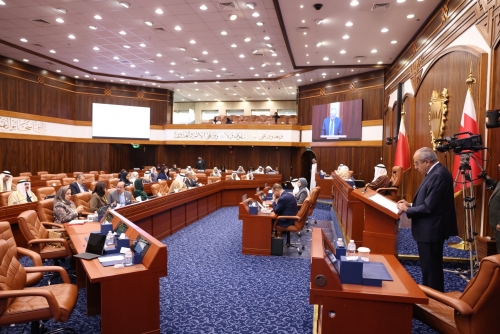Shura approves $5 oil deduction for Future Generations Fund
TDT | Manama
Email: mail@newsofbahrain.com
Oil-export deductions for Bahrain’s Future Generations Reserve are set to rise to $5 per barrel, following the Shura Council’s approval of a new law yesterday.
The move links the deductions to oil prices above $120, with the aim of shoring up resources for future generations and strengthening Bahrain’s financial stability.
Parliament had already approved the bill earlier this month.
The legislation amends Article 1 of Law No. 28 of 2006, adjusting the deductions taken from exported oil barrels.
Long-term growth
Khalid Al Maskati, a Shura Council member, explained that the reserve acts as a sovereign fund designed to ensure longterm growth while allowing the kingdom to respond to crises when needed.
“The reserve played a key role during the COVID-19 pandemic, helping the government meet urgent needs,” he said, adding that the fund is crucial for protecting the rights of future generations.
Under the revised law, deductions will be tiered: $1 per barrel for prices above $40 but below $60, $2 per barrel for prices above $60 but below $80, $3 per barrel for prices above $80, $4 per barrel for prices above $100, and $5 per barrel for prices exceeding $120.
Legal approval
These deductions are reserved exclusively for the ‘Future Generations Reserve’, with no adjustments or withdrawals permitted without legal approval.
The Shura Council’s Financial and Economic Affairs Committee said the reserve has been an essential tool for maintaining Bahrain’s financial stability.
“It’s more than just a fund,” a committee member noted. “It’s a protection for the future, helping us weather economic storms and ensuring that resources are available when they’re most needed.”
Abdulla Al Nuaimi, another council member, called for a broader approach to what constitutes a reserve.
He suggested that tangible assets, such as land or gold, should be prioritised over cash or liquid investments.
“Land has enduring value,” he said. “Instead of relying solely on money, we should earmark large plots for future use. These could support housing projects or other essential services without draining government finances.”
The Financial and Economic Affairs Committee echoed this sentiment, pointing out that such assets could preserve wealth over time while ensuring stability.
During the COVID-19 pandemic, the reserve demonstrated its worth by enabling quick responses to national challenges, proving its flexibility in times of uncertainty.
Related Posts

